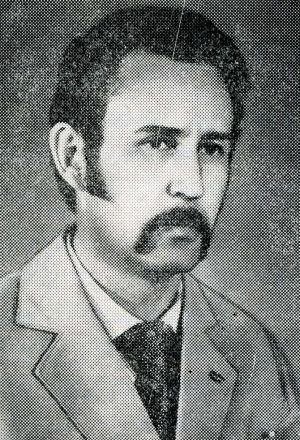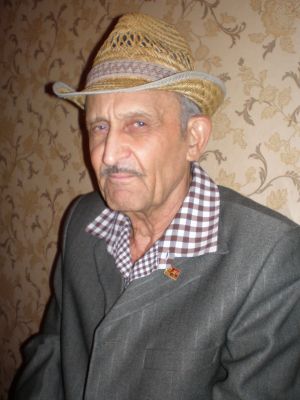Historian, teacher, proponent of reforming scientific knowledge.
From a family of rural socialist intelligentsia who participated in revolutionary events. His father was Ivan Antonovych (1903-1975), and his mother was Maria Semenivna Ryashchenko (1915-2001) (both were civil servants).
In 1952, Yuriy finished 4th grade in Huliaipole, then lived with his father in Kuban and the Far East. In 1955, he returned to his mother in Horlivka (Donetsk region), where he graduated from secondary school No. 59 in 1958. Notably, he was exempt from studying Ukrainian language and literature. He was intellectually developed and well-read beyond his years. After finishing school, he worked as a marker and milling machine operator at machine-building plant No. 21. From 1959-1962, he studied at the motor transport technical college in Dnipropetrovsk. From 1962-65, he served in the army in Bohodukhiv and Kirovohrad, studied at the sergeants' school in Desna, and was demobilized in Kirovohrad. He already had ideological conflicts there and left the Komsomol. The KGB became interested in him, but it ended with a stint in the guardhouse, where he read Marx.
After demobilization, he worked as an engineer at Donbasenergo PJSC in Horlivka.
From 1966-72, he studied full-time and then by correspondence at the history department of Donetsk State University, specializing as a historian and social scientist. During his studies, realizing the essence and direction of Russification, he consciously returned to his Ukrainian identity. He began teaching in 1968.
From 1972, M. lived in Kyiv, working diligently in academic libraries, independently seeking ways to eliminate the crisis phenomena in the modern system of scientific knowledge. He tried to enroll in postgraduate studies. He socialized with the Ukrainian intelligentsia who had survived the arrests.
In 1976, he returned to Horlivka and taught history in vocational schools and general schools. Outside of work, he spoke exclusively Ukrainian. A vegetarian, he became interested in yoga and self-healing. This behavior seemed suspicious to the KGB, and on April 2, 1981, M. was arrested on charges of conducting anti-Soviet agitation and propaganda (Part 1, Article 62 of the Criminal Code of the UkrSSR). There was no real case: they found a few unconventional statements and records, namely a translation of the “Two Thousand Words” manifesto of the Prague Spring and personal notebooks. On August 14, 1981, he was sentenced by the Donetsk Oblast Court to 7 years of imprisonment in strict-regime camps and 5 years of exile. He served his time in camp ZhKh-385/3 in the village of Barashevo, Mordovian ASSR, where Dmytro MAZUR, Fred ANADENKO, Yuriy BADZIO, Mykola Krainyk, and others were at the time. He participated in protest actions. In the zone, he became a strict vegetarian. From 1973 to 1987 (until his very release), he practically never went to the canteen, taking raw vegetables from the camp store and his bread ration from the kitchen. As a result, he suffered from a whole range of illnesses. At the time of his release, he weighed 54 kg.
He was released on February 4, 1987, by a decree of the Presidium of the Supreme Soviet of the USSR during a “pardon” campaign, although he had not requested one. He was rehabilitated in 1992 under the Law of the Ukrainian SSR “On the Rehabilitation of Victims of Political Repression in Ukraine” of April 17, 1991.
He worked as a laboratory assistant at the Donetsk Polytechnic Institute and as a teacher in schools No. 16, No. 75, and No. 58 in Horlivka. He has been retired since 2001.
As a supporter of reforms based on reformed scientific knowledge, and with his own vision for the whole complex of social problems, he took an active part in “perestroika.” He was among the organizers of the People's Movement (Rukh), the URP, “Prosvita,” and the Society of the Repressed in Horlivka and in the Donetsk oblast. He was a candidate for People's Deputy of Ukraine in the elections of March 27, 1994. After that, he withdrew from political affairs.
He is interested in the philosophy of science and religion, esoteric knowledge, folk medicine, and gardening. In his home, he has recreated the “Family Temple of a 21st-Century Ukrainian Ridnovir.”
Divorced. He lives in Horlivka. He has a son, Vadym, born in 1962.
He remains a “dissident” even in independent Ukraine, unsuccessfully seeking support among the “patriots of perestroika” to advance his “Reform of the System of Modern Scientific Knowledge” and to reform all spheres of public life on this basis (in education, ideology, politics, and state-building as a whole).
Bibliography:
Interview from September 20, 2011.
Y. Melnyk’s Archive.

MELNYK YURIY IVANOVYCH

MELNYK YURIY IVANOVYCH